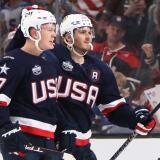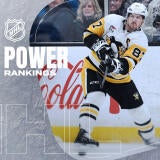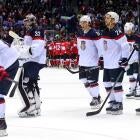Discarded by Blackhawks, Trevor Daley now playoff star for Penguins
Two teams traded Trevor Daley in five months. The Pittsburgh Penguins have benefited from that and he was perhaps their most important player in a Game 4 overtime victory.

PITTSBURGH -- Mike Sullivan made his debut behind the Pittsburgh Penguins bench on Dec. 14 with a 4-1 loss to the Washington Capitals, continuing what had been a miserable start to the season for a team that was on the outside of the Eastern Conference playoff picture and going through its second coaching change in as many years. During that very game, sometime in the third period, the Penguins announced what seemed to be a minor trade that would send defenseman Rob Scuderi to the Chicago Blackhawks for Trevor Daley.
At the time, the biggest reaction to it, mainly from within the city limits of Pittsburgh, was pretty much limited to, "wow ... the Penguins actually got an NHL player for Rob Scuderi" without any concern for whether or not that player could actually play. It was viewed as an immediate upgrade simply because Scuderi, one time a key contributor -- and popular player -- on a Stanley Cup-winning team in Pittsburgh, had become such a liabilty on their blue line that they were happy to see anybody else come in to replace him.
Nobody could have possibly anticipated the impact Daley would eventually have on the Penguins.
During their 3-2 overtime victory in Game 4 of their second-round series against the Capitals on Wednesday night, he was probably their most important player.
It was in that playoff game he had to take on an entirely new role and try to help replace the Penguins' best defenseman -- Kris Letang -- who was out of the lineup due to a one-game suspension for a needlessly late hit on Capitals forward Marcus Johansson in Game 3 of this series. Losing Letang in the playoffs a year ago to injury was a significant blow that the Penguins simply could not overcome in their first-round series against the New York Rangers, and it was one of the biggest reasons they were easily dispatched in five games.
Letang can affect a game like few other defensemen in the league, and there really is no way to just replace him, especially when he had been playing close to 30 minutes per game at times this postseason.
Daley said after the game they knew it wasn't going to be any one guy who was going to step up in those minutes, but that it had to be all six of them to do it.
And even though Sullivan said he was happy with all of his defensemen and the way they played in Letang's absence Wednesday, Daley was the one who clearly took on the biggest role and made the biggest impact.

He played a career-high 28 minutes, scored a goal and played the role of a top defenseman without ever looking out of place.
If you would have suggested that outcome back in December on the night of the trade, you probably would have been laughed out of the building.
Even Daley himself did not really see it coming.
"At the start of the year in Chicago and ending up here ... I would have told you 'no,' " Daley said Wednesday night when asked if he ever expected his season to follow this kind of path.
"It's funny how this game works. You stick with it and good things happen. I'm grateful for the opportunity, I'm in a good place in Pittsburgh, I'm enjoying a great group of guys and we are enjoying this."
His journey this season started with Dallas, where he spent the first 10 years of his career, trading him to the Blackhawks in the blockbuster offseason trade that sent Patrick Sharp the other way. From a Dallas perspective, the trade made sense. The Stars were getting a major addition to the lineup who would help them become one of the top offensive teams in the league.
He never seemed to be a fit with Chicago, though, and five months later -- after playing a limited role in 29 games -- he was eventually swapped straight up for Scuderi in a deal that gave Chicago nothing more than some additional salary-cap space. Scuderi was then later traded by the Blackhawks to the Los Angeles Kings for Christian Ehrhoff. Ehrhoff would play in eight games for the Blackhawks.
While the Blackhawks had little use for Daley, he proved to be a huge addition for the Penguins.
Almost immediately, Daley helped address what had been one of the Penguins' biggest shortcomings early in the season by adding some much-needed mobility to their blue line that would help them get the puck out of the defensive zone. He was an instant fit for the type of hockey Sullivan wanted to play in Pittsburgh, and along with the trade for Carl Hagelin and some speedy callups from the American Hockey League, helped get the team going in the right direction.
He spent most of his time after the trade playing alongside Brian Dumoulin and forming an underrated second pairing. When they were on the ice together during the regular season, the Penguins were a 53 percent possession team and scored 60 percent of the goals. They weren't perfect, but it worked, and together with Letang and Olli Maatta helped create a defense that was suddenly rich in mobile defenders who could move the puck and play defense by ... well, not having to actually play in the defensive zone.
In a lot of ways, Daley is like just about every other defenseman on the Penguins roster. He does some things well (mobility, making plays with the puck), but has some flaws that teams might stress about (not overly physical, sometimes struggles in the defensive zone). But like the rest of the guys on the blue line, the Penguins have found a way to make their perfectly imperfect group work. Daley's success is perhaps the best example of it. On Wednesday night, it was the most important example.
















